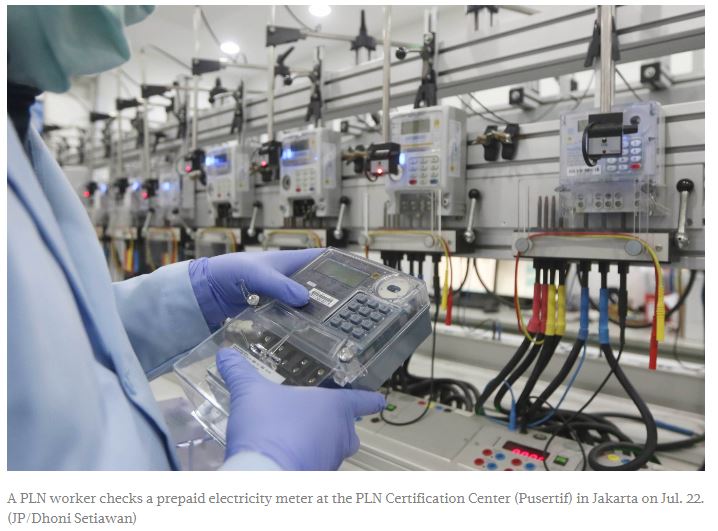Indonesia: PLN to waive minimum electricity fees for businesses, public services
The government has ordered state-owned electricity giant PLN to waive minimum monthly electricity fees for businesses, industries and public services to expedite Indonesia’s economic recovery.
The fees will be waived for 400,000 such entities for power consumed between July and December. The deductions will be reflected in bills in the following month. The electricity giant will be compensated by the government with funds from the state budget.
PLN and the government are drafting regulations to implement the relief scheme, which had been requested by businesses themselves, said Energy and Mineral Resources Ministry electrification director general Rida Mulyana on July 30.
“Some businesses told PLN and the government, ‘Pak, I have no work right now. It’s all closed. I’m using less than 40 hours of electricity. I just want to pay for 20 hours,’” Rida said during an online press briefing.
Existing regulations require PLN’s business, industrial and public service customers in or above the 1,300 volt-ampere (VA) category – medium to big enterprises – to pay for at least 40 hours of electricity each month, even if they do not make use of it.
In comparison, similar customers within the 900VA category – small enterprises – have to pay a fixed rupiah amount per month. PLN will also waive these fees.
“Customers will only pay for the kilowatt hours (kWh) they use,” said PLN spokesman Agung Murdifi in a statement on Jul. 30.
Erasing electricity bill minimums is the third power-related relief scheme introduced by the government to protect Indonesians from the economic downturn resulting from the COVID-19 pandemic.
The government previously ordered PLN to waive or halve the power bills of Indonesia’s 24 million poorest households and to provide free electricity to 500,000 small businesses that fell in the lowest 450 VA category.
For businesses and industries above the 450 VA category, fixed costs such as power bills have strained their finances as spending remained high while revenues fell, said Indonesian Employers Association (Apindo) deputy chairman Bob Azam.
He said hotels’ power bills made up roughly half of their fixed costs during the pandemic. The other half was from employee compensation.
“If we have more flexibility, maybe we can survive a little longer,” he told The Jakarta Post.
The relief program is expected to halve the entities’ combined six-month power bills, worth Rp 5.6 trillion ($385 million) with the minimums included, said Coordinating Economic Minister Airlangga Hartanto on Jul. 27.
The government will compensate PLN for the Rp 3 trillion cut, 47 percent of which will go to 29,377 industrial customers, 43 percent to 565,994 businesses and 10 percent to 669,535 public service providers.
“We’ll prepare the Finance Ministerial decree immediately,” said Airlangga, who also chairs the COVID-19 national economic recovery committee.
Offering another perspective, Herman Ibrahim, country chairman of the Paris-based International Council on Large Electric Systems (CIGRE), said that electricity minimums were a problematic practice in general.
The more common practice was including all of an electricity company’s costs into its price per kWh, he said.
“Customers really don’t want minimums,” he told the Post. “It’s not just that they’d be more hesitant to join [PLN programs], but also, can they pay for such minimums?”
Source: https://www.thejakartapost.com/news/2020/08/03/pln-to-waive-minimum-electricity-fees-for-businesses-public-services.html


 English
English




